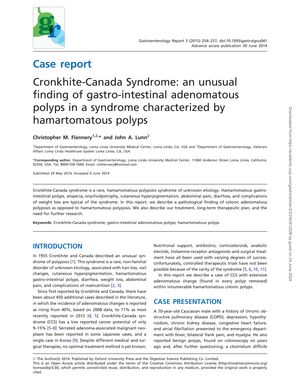TLDR Cronkhite-Canada syndrome can sometimes show unusual colonic adenomatous polyps.
Cronkhite-Canada syndrome, a rare condition characterized by hamartomatous gastrointestinal polyps, alopecia, onychodystrophy, cutaneous hyperpigmentation, abdominal pain, diarrhea, and weight loss, was found to have an unusual presentation of colonic adenomatous polyposis in this report. The study detailed the pathological findings, treatment approach, long-term therapeutic plan, and emphasized the necessity for further research.
 21 citations
,
January 2013 in “Clinical Endoscopy”
21 citations
,
January 2013 in “Clinical Endoscopy” First Korean case of Cronkhite-Canada syndrome with colon cancer and serrated adenoma.
 4 citations
,
May 2022 in “Journal of Nepal Medical Association”
4 citations
,
May 2022 in “Journal of Nepal Medical Association” Steroids, infection management, and nutritional support can significantly improve symptoms of Cronkhite-Canada Syndrome.
 53 citations
,
May 2001 in “The American journal of the medical sciences”
53 citations
,
May 2001 in “The American journal of the medical sciences” Chemotherapy can cause various skin problems, and recognizing them helps improve patient care.
6 citations
,
November 2018 in “Case reports in nephrology and dialysis” Rituximab may be an effective treatment for Cronkhite-Canada syndrome with kidney disease.
October 2017 in “The American Journal of Gastroenterology” Early diagnosis and nutritional support are crucial for managing Cronkhite-Canada Syndrome.
6 citations
,
December 2015 in “Medicine” Cronkhite-Canada syndrome may be more treatable and less severe than previously thought.



